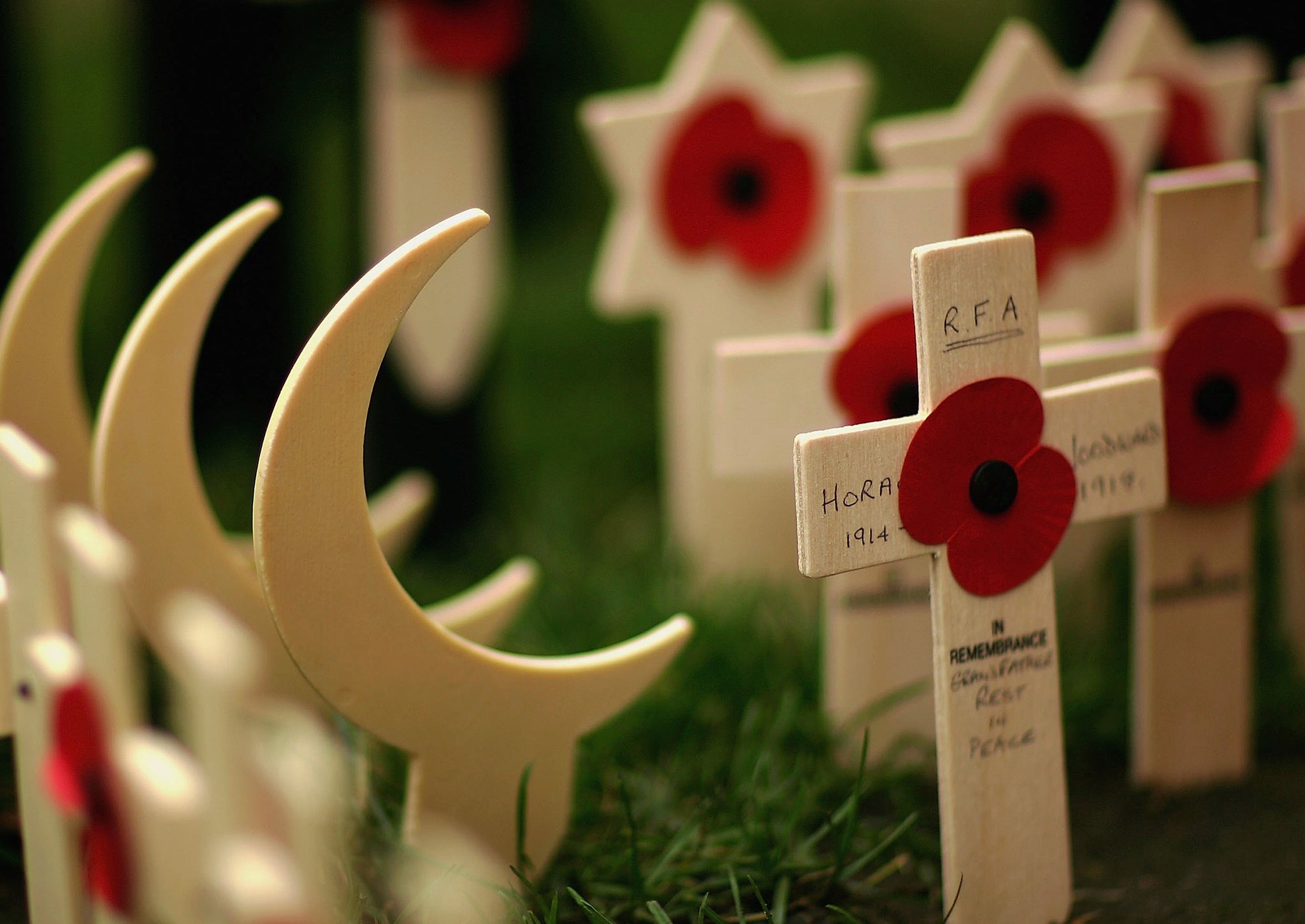The centenary of Armistice Day is the perfect chance to finally mark the sacrifice of fallen Muslims
Whether from North Africa or other far-flung outposts of empire, these soldiers were immensely brave and loyal fighters – and frequently deployed in frontline positions or suicidal charges


Of all the horrific sights witnessed by British soldiers during the First World War, the gassing of two divisions of French colonial troops was one of the most depraved.
The Imperial German Army unleashed clouds of toxic yellow-green smoke on April 22 1915, suffocating thousands of men during the Second Battle of Ypres in Belgium. It was the first mass chlorine gas attack in history, and broke all agreements then governing lethal chemicals.
Sir John French, commander-in-chief of the British forces, was among those who first saw the aftermath of the carnage, noting that it was “a cynical and barbarous disregard of the well-known usages of civilised war”.
The manner in which many died was scarcely believable. English sergeant Alfred West described French Algerians “almost visibly blowing up – their bodies were going coloured, but they were blowing up. You could put your finger in them and almost make a little hole.” In Sebastian Barry’s A Long Long Way – a novel based on historical facts – Captain Pasley recalls, “Those poor men of Algiers ... tearing off their uniforms and writhing on the ground, and howling; howling was the word for it ... The colonial men were roaring now, and there were other frightening cries ... Horrible laments rose from the affronted Algerians.”
As people around the world mark the centenary of the Armistice on 11 November, they should finally spare a thought for the many Muslims involved. Hundreds of thousands fought and many were maimed and killed in the Great War of 1914-18.
Whether from North Africa or other far-flung outposts of empire, these Muslims were immensely brave and loyal fighters – ones frequently deployed in frontline positions and in suicidal charges. More than 400,000, mainly from India, served with the British alone.
At a time when Muslims are routinely portrayed by propagandists as either an enemy within or new arrivals threatening the very fabric of western society, it is crucial that their true stories are known. In all, some 2.5 million Muslims contributed to the Allied victory during the First World War, as soldiers and in support roles. The majority of those who lost their lives in the miles of noxious smoke at Ypres were from Algeria, then France’s largest colony. Many were drafted into action as cannon fodder as early as 1914, while generals were still recruiting and training their own countrymen. Few of these Muslims had even heard gunfire before, and reacted particularly badly to freezing temperatures.
Sadly, Britain’s primary means of remembrance – images from the time, literature, films and other media with mass appeal – hardly ever mentions any Muslims. The literary genius Wilfred Owen, who was killed a week before the Armistice while fighting with the Manchester Regiment, depicts a chlorine gas attack with the words “Gas! GAS! Quick, boys!” in his poem “Dulce et Decorum Est”. Just like the American artist John Singer Sargent’s painting Gassed, Owen’s work is associated with young white men devoted to their king, a Christian god and a British heartland. They were part of a lost generation of brilliant poets, artists, politicians, sportsmen, scientists and those from many other fields of national life who would never reach their full potential.
Muslims sharing those conflict experiences were, however, viewed as culturally dislocated – and, frankly, the wrong colour to be included in anything that stirred patriotic feelings, whether books or commemorative services.
Victory did not result in citizenship for these soldiers either, nor any kind of substantial recognition. Just as often racist commanders treated them with suspicion on the battlefield, so the prejudice continued in the years afterwards.
The British had not allowed Indian troops to fight against the Boers in South Africa between 1899 and 1902 because there was a fear they might mutiny. By 1914 the Indians could engage the enemy in Europe, and in African and Middle Eastern theatres. They also felt confident they would be granted self-rule after victory in 1918.
Such wishes were denied, however, and India did not become independent until 1947. For the Algerians it was even longer: the martial spirit that had been cultivated in the European countryside was ultimately directed at colonial “masters” in the bloody Algerian War of Independence that achieved its aim in 1962.

In the meantime, there were at least some efforts made by the French to acknowledge Muslim sacrifice. The beautiful and prominently placed Grand Mosque of Paris was, for example, opened in 1926 to thank Muslim tirailleurs – light infantrymen – for laying down their lives. There are rows of steles – engraved with Arabic inscriptions and the Islamic star and crescent – facing Mecca in most war cemeteries across France too.
Generally, however, such fallen heroes are a brief footnote in history. They are certainly ignored by the politicians and rabble-rousers who want to reduce Muslims to an undesirable subclass. Such poisonous portrayals should be challenged at every opportunity, and there is no better time to start doing this than 11 November.
Bookmark popover
Removed from bookmarks